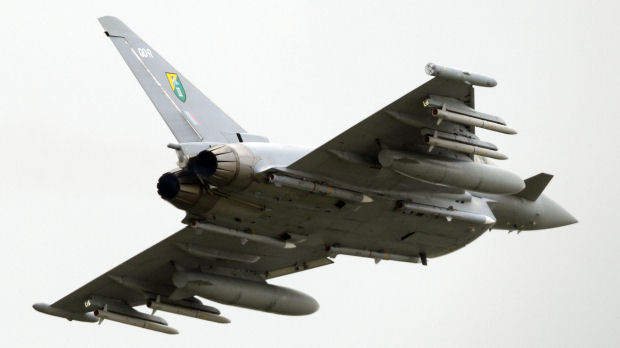Spare parts shortage grounds RAF jets
Pilots of the RAF’s top fighter jets – currently in action over Libya – are being grounded as a lack of spare parts means they cannot put in the flying hours to keep their skills up to date, MPs warn.

Five Typhoon pilots were temporarily grounded last year because of a lack of aircraft availability, the Commons Public Accounts Committee said.
The shortages are also affecting the training programme, with only eight of the Royal Air Force’s 48 Typhoon pilots qualified for ground attack operations – the role the planes are currently being used for in Libya.
Earlier this week the planes destroyed two tanks near Misrata in their first aggressive deployment since entering service in the British Armed Forces.
The RAF is currently having to cannibalise aircraft for spare parts in order to keep the maximum number of Typhoons in the air on any given day.
The history of the Typhoon fighter aircraft represents yet another example of over-optimism, bad planning and an unacceptably high bill for the taxpayer. Committee Chair Margaret Hodge
The Committee warned the problems were likely to continue until 2015 – as wider defence cuts also begin to bite across the military.
Problems
“Problems with the availability of spare parts have meant that Typhoons are not flying as many hours as the department requires,” the Committee said.
“The Typhoon supply chain is complex and stretches across Europe. However, the department admitted that it had not been managed well enough or delivered all the required parts when needed.”
Read more: Multibillion Typhoon Eurofighter jet overspend revealed
There have long been questions over the financial management of the Typhoon jet programme.
In March, the National Audit Office revealed that the jets had cost the taxpayer 75 per cent more than expected – even though the Ministry of Defence has bought fewer planes than it originally envisaged.
The cost of the project rose by £3.5bn, despite the MoD buying 72 less planes than it planned – 160, down from 232.The project in total has cost £20.2bn.
Committee Chair Margaret Hodge said: “The history of the Typhoon fighter aircraft represents yet another example of over-optimism, bad planning and an unacceptably high bill for the taxpayer.
“This pattern of decision-making is more about balancing the books in the short-term rather than ensuring value for money over time.”
Under control
But Defence Secretary Liam Fox said the project was “under control”.
“The NAO’s March report concluded that after years of financial mismanagement and project delays under the previous Government, the Typhoon project has been turned around,” he said.
“The project is finally under control and back on track. The PAC report recognises that the MoD and industry have worked to resolve spares issues and performance targets are now being met.
“The Typhoon is a world beating, air-to-air fighter and is fast developing a ground attack capability as is being demonstrated in Libya. We have sufficient numbers of qualified ground attack pilots to meet our operational tasks and this number is increasing all the time…I am determined that in the future such projects are properly run from the outset, and I have announced reforms to reduce equipment delays and cost overruns.
“I will also chair regular major projects review boards to ensure our armed forces are well equipped and taxpayers get value for money.”
-
Latest news
-
As India goes to the polls in the world’s largest election – what do British-Indians think?6m

-
Tees Valley: Meet the candidates in one of the biggest contests coming up in May’s local elections4m

-
Keir Starmer says public sector reform will be a struggle7m

-
Nicola Sturgeon’s husband Peter Murrell charged with embezzlement of funds from SNP1m

-
Ukraine might finally get $60billion in American weapons and assistance to defend against Russia3m

-




